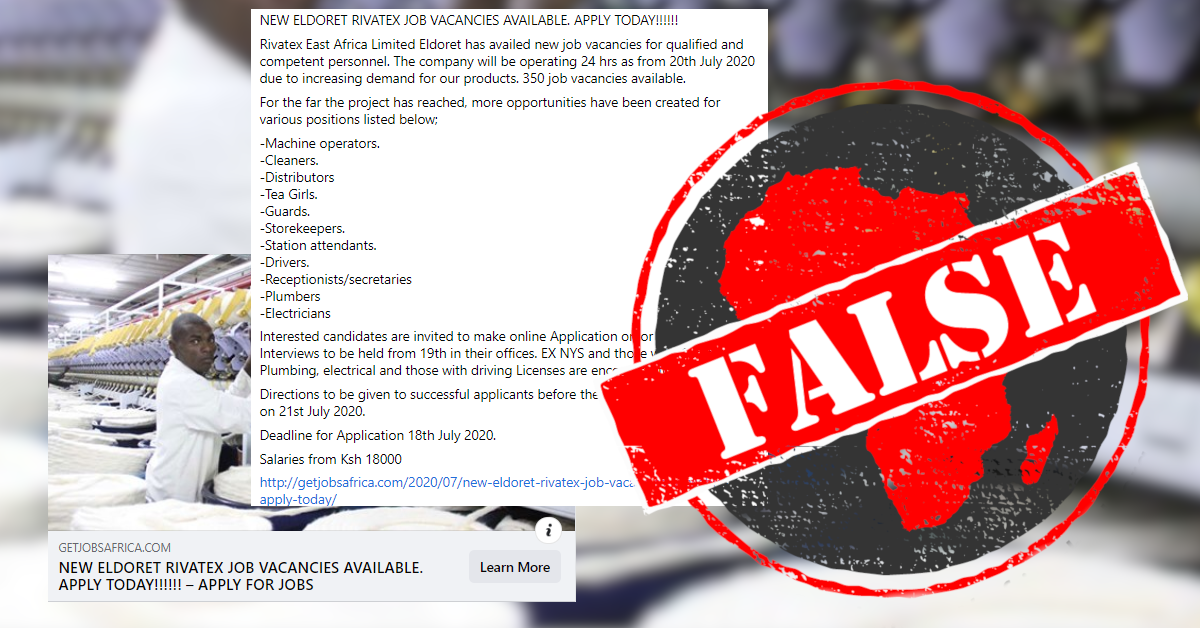The Facebook page “Rivatex Jobs” offers fake jobs at Rivatex East Africa Limited, a textile manufacturer in Eldoret in Kenya’s Rift Valley region – for a fee.
The scam page has been targeting unsuspecting job seekers for more than two years. It was created on 4 May 2018.
Posts on the page link to a WordPress blog with the URL getjobsafrica.com. The blog site, in turn, lists a range of other fake ads for jobs at various organisations.
The format of the adverts and the requirements for recruitment closely resemble job scam tactics that usually appear on Google Forms – and that Africa Check has exposed many times before. For instance, a wide range of positions are advertised with minimal requirements, such as having a national identification card, phone number and a bank account.

To apply for any of the jobs, people have to pay a KSh350 “registration fee”. This is how the scammers make their money.
“It is not a thing of you paying us. We want you to prove to us that you are actually willing to take up this job and you are indeed in need of employment. Note: Only applicants who have paid registration fee will be considered,” reads one of their favourite lines.
But getjobsafrica.com is not a Rivatex site, or associated with the company. The official Rivatex website is rivatex.co.ke.
The blog site has appeared on another scam Facebook page that Africa Check has exposed. And Rivatex has warned that its job advertisements are only made public in local newspapers and on its website.
To protect yourself against scams, read our guide to Facebook scams and how to spot them. Always report suspicious Facebook posts by clicking “report post” on the top right of any post. – Dancan Bwire
The scam page has been targeting unsuspecting job seekers for more than two years. It was created on 4 May 2018.
Posts on the page link to a WordPress blog with the URL getjobsafrica.com. The blog site, in turn, lists a range of other fake ads for jobs at various organisations.
The format of the adverts and the requirements for recruitment closely resemble job scam tactics that usually appear on Google Forms – and that Africa Check has exposed many times before. For instance, a wide range of positions are advertised with minimal requirements, such as having a national identification card, phone number and a bank account.

‘Registration fee’
To apply for any of the jobs, people have to pay a KSh350 “registration fee”. This is how the scammers make their money.
“It is not a thing of you paying us. We want you to prove to us that you are actually willing to take up this job and you are indeed in need of employment. Note: Only applicants who have paid registration fee will be considered,” reads one of their favourite lines.
But getjobsafrica.com is not a Rivatex site, or associated with the company. The official Rivatex website is rivatex.co.ke.
Report fake posts to Facebook
The blog site has appeared on another scam Facebook page that Africa Check has exposed. And Rivatex has warned that its job advertisements are only made public in local newspapers and on its website.
To protect yourself against scams, read our guide to Facebook scams and how to spot them. Always report suspicious Facebook posts by clicking “report post” on the top right of any post. – Dancan Bwire
Republish our content for free
For publishers: what to do if your post is rated false
A fact-checker has rated your Facebook or Instagram post as “false”, “altered”, “partly false” or “missing context”. This could have serious consequences. What do you do?
Click on our guide for the steps you should follow.
Publishers guideAfrica Check teams up with Facebook
Africa Check is a partner in Meta's third-party fact-checking programme to help stop the spread of false information on social media.
The content we rate as “false” will be downgraded on Facebook and Instagram. This means fewer people will see it.
You can also help identify false information on Facebook. This guide explains how.


Add new comment